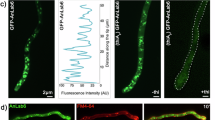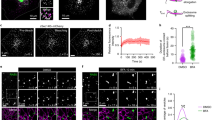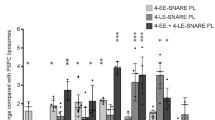Abstract
THE specificity of vesicular transport in a cell is determined by the formation of vesicles with specific contents from a donor compartment and their selective fusion with the appropriate acceptor compartment. Several of the latter fusion steps have been investigated in detail using cell-free systems1–9, and work with these systems as well as genetic evidence has revealed a role for GTP-binding proteins in membrane fusion processes7–15. We have reconstituted the formation of constitutive secretory vesicles and immature secretory granules from the trans Golgi network in a cell-free system16. We show here that the budding of both types of post-Golgi vesicles is inhibited by non-hydrolysable analogues of GTP, which suggests a more widespread role for GTP-binding proteins in membrane traffic than previously assumed.
This is a preview of subscription content, access via your institution
Access options
Subscribe to this journal
Receive 51 print issues and online access
$199.00 per year
only $3.90 per issue
Buy this article
- Purchase on SpringerLink
- Instant access to full article PDF
Prices may be subject to local taxes which are calculated during checkout
Similar content being viewed by others
References
Balch, W. E., Dunphy, W. G., Braell, W. A. & Rothman, J. E. Cell 39, 405–416 (1984).
Davey, J., Hurtley, S. M. & Warren, G. Cell 43, 643–652 (1985).
Gruenberg, J. E. & Howell, K. E. EMBO J. 5, 3091–3101 (1986).
Braell, W. A. Proc. natn. Acad. Sci. U.S.A. 84, 1137–1141 (1987).
Beckers, C. J. M., Keller, D. S. & Balch, W. E. Cell 50, 523–534 (1987).
Diaz, R., Mayorga, L. & Stahl, P. J. biol. Chem. 263, 6093–6100 (1988).
Goda, Y. & Pfeffer, S. R. Cell 55, 309–320 (1988).
Baker, D., Hicke, L., Rexach, M., Schleyer, M. & Schekman, R. Cell 54, 335–344 (1988).
Ruohola, H., Kabcenell, A. K. & Ferro-Novick, S. J. cell Biol. 107, 1465–1476 (1988).
Salminen, A. & Novick, P. J. Cell 49, 527–538 (1987).
Melancon, P. et al. Cell 51, 1053–1062 (1987).
Segev, N., Mulholland, J. & Botstein, D. Cell 52, 915–924 (1988).
Goud, B., Salminen, A., Walworth, N. C. & Novick, P. J. Cell 53, 753–768 (1988).
Beckers, C. J. M. & Balch, W. E. J. cell Biol. 108, 1245–1256 (1989).
Mayorga, L. S., Diaz, R. & Stahl, P. D. Science 244, 1475–1477 (1989).
Tooze, S. A. & Huttner, W. B. Cell 60, 837–847 (1990).
Orci, L., Malhotra, V., Amherdt, M., Serafini, T. & Rothman, J. E. Cell 56, 357–368 (1989).
Bourne, H. R. Cell 53, 669–671 (1988).
Author information
Authors and Affiliations
Rights and permissions
About this article
Cite this article
Tooze, S., Weiss, U. & Huttner, W. Requirement for GTP hydrolysis in the formation of secretory vesicles. Nature 347, 207–208 (1990). https://doi.org/10.1038/347207a0
Received:
Accepted:
Issue Date:
DOI: https://doi.org/10.1038/347207a0
This article is cited by
-
Discovery and progress in our understanding of the regulated secretory pathway in neuroendocrine cells
Histochemistry and Cell Biology (2008)
-
A role for phosphatidylinositol transfer protein in secretory vesicle formation
Nature (1995)
-
Golgi apparatus isolation and use in cell-free systems
Protoplasma (1993)
-
Genes and proteins required for vesicular transport from the endoplasmic reticulum
Antonie van Leeuwenhoek (1992)



